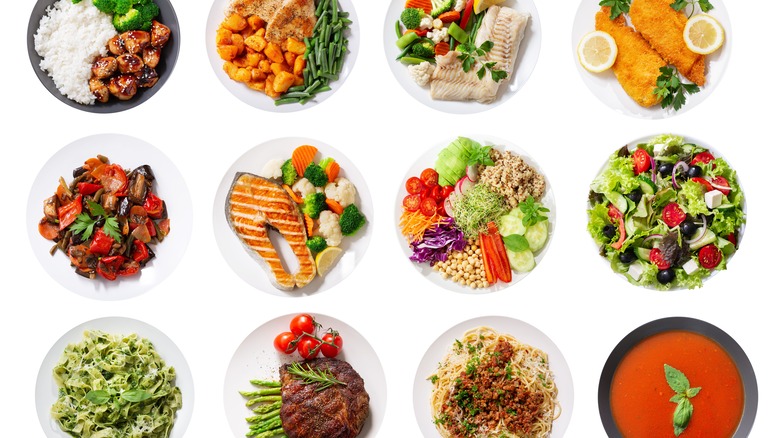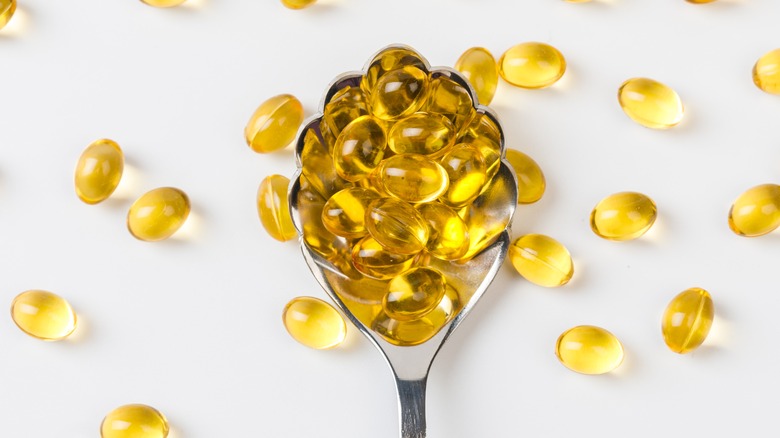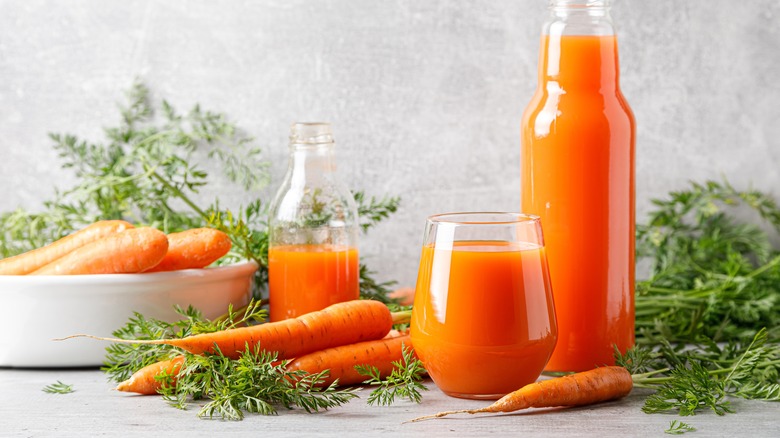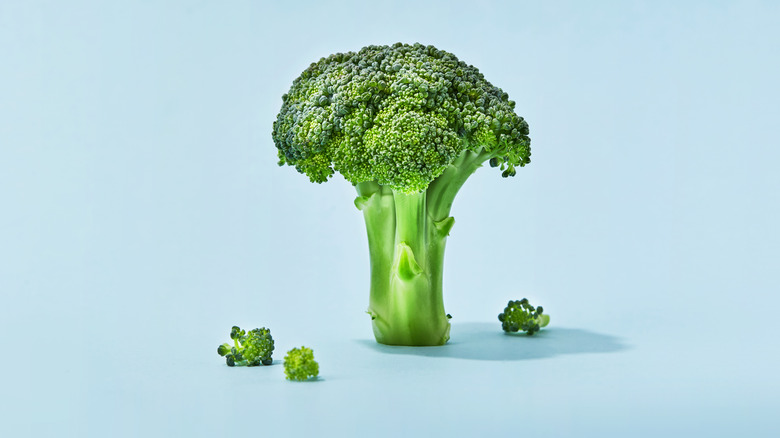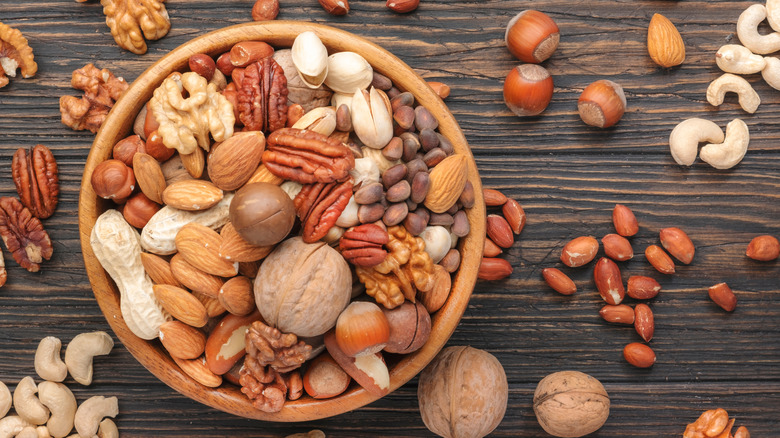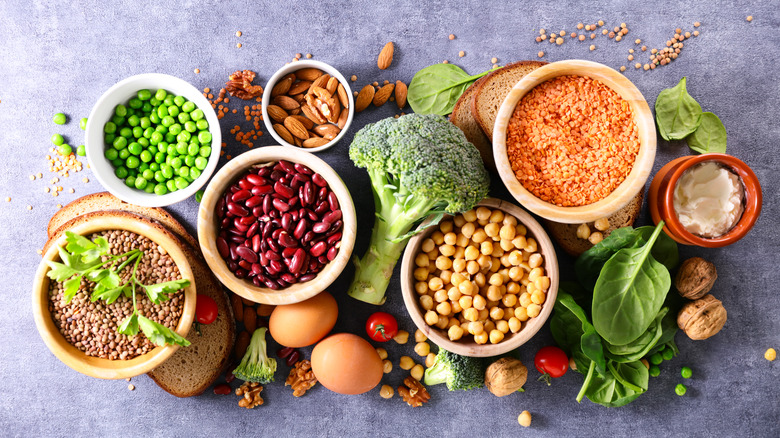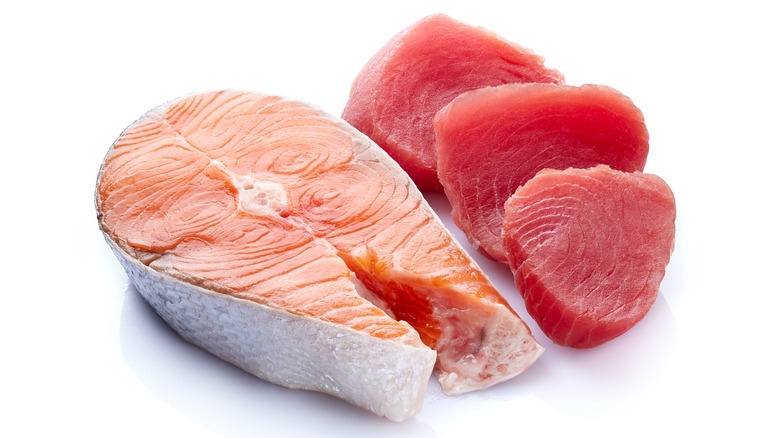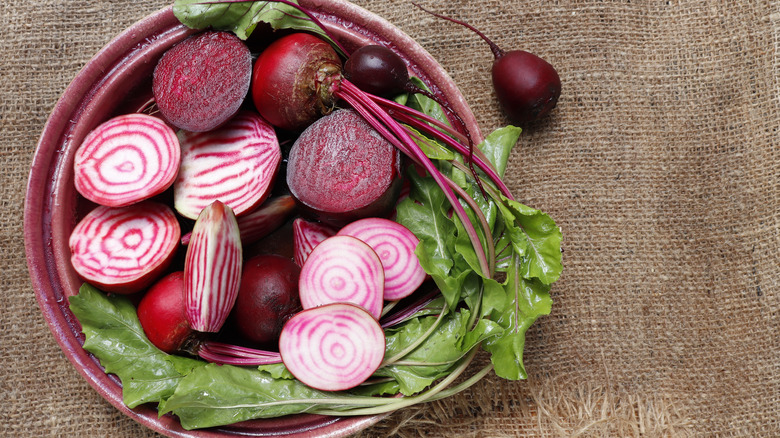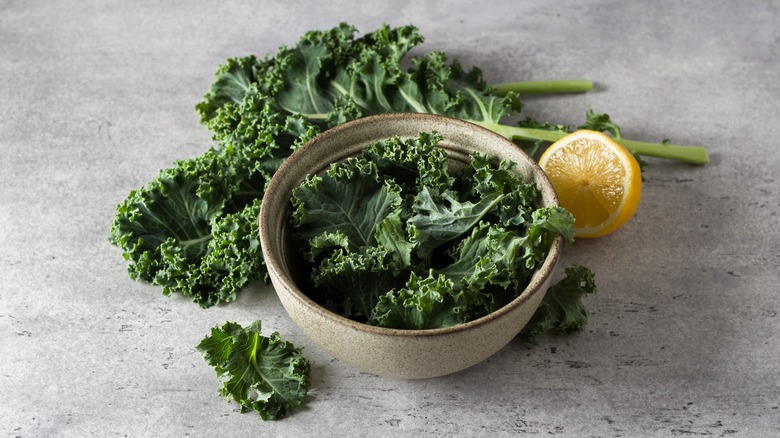The Different Purposes Of Vitamins Explained
Vitamins are raw materials your body uses to sustain life, according to HelpGuide. The roles they play number in the hundreds, and include boosting your immune system, healing wounds, and strengthening your bones. They're called micronutrients because you need only a small amount, but those small quantities are essential to ward off disease and maintain optimal health.
Vitamins are organic, unlike their inorganic counterpart minerals which hold their chemical structure and easily make their way from soil and water into your body. Their organic nature means vitamins are vulnerable to destruction by air, heat, or acid, and may also become depleted when foods in which they are contained are cooked in water (via Healthline). Despite these potential pitfalls, Harvard Health Publishing confirms that the best way to get the nutrients you need in the right amounts is a balanced, varied, and healthy diet.
Oregon State University explains that to be considered a vitamin, a compound must be organic and result in obvious deficiency symptoms when it's missing from your diet. Researchers have identified 13 such compounds that we call vitamins, which are either fat or water soluble and available via food or supplements.
Fat vs. Water Soluble
Vitamins are either fat or water soluble (per WebMD). The fat-soluble vitamins are A, D, E, and K. Their water-soluble counterparts include vitamin C and all the B vitamins.
After your body has used the fat-soluble vitamins from food or supplements, it stores the excess in fat and liver tissue. Because your body stores these vitamins, there's a chance you can experience toxicity if you consume vitamin supplement doses that are too high, according to Colorado State University. A balanced diet of natural food isn't likely to cause toxicity issues.
Water soluble vitamins wash away easily. Without a regular intake of these vitamins, you may be at risk of a deficiency since your body can't store them (via the National Library of Medicine). Water soluble vitamins have many food sources, so deficiencies in these vitamins are rare in North America. However, you may experience deficiency if you live with alcohol use disorder, a malabsorption syndrome, or another cause of malnourishment. Short bowel syndrome is a type of malabsorption syndrome that can lead to malnutrition if enough of the bowel is missing, since this is where your body absorbs vitamins. Vegans should take a vitamin B12 supplement, since this water-soluble nutrient exists primarily in animal sources (via Healthline).
Vitamin A
It's not just a myth — carrots really can help your eye health, according to Harvard T.H. Chan School of Public Health. They're a source of beta-carotene, which your body converts on an as-needed basis into retinol, also known as vitamin A (via Mount Sinai). In addition to supporting eye health, vitamin A also helps your immune system and organs work properly (via the National Institutes of Health).
The human diet contains two primary types of vitamin A: preformed (retinol and retinyl esters), and carotenoids that your body converts to retinol (via Harvard T.H. Chan School of Public Health). Preformed vitamin A exists in fortified foods, like juices, cereals, and dairy products, as well as vitamin supplements and animal products. Plant sources provide the carotenoids like beta-carotene that are precursors to retinol. Beta-carotene exists in vitamin supplements, as well as fruits and vegetables like cantaloupe, sweet potatoes, broccoli, spinach, and lettuce in addition to carrots (via Mount Sinai).
The recommended daily amount of retinol activity equivalents for men aged 19 years and older is 900 micrograms (3,000 IU), and for women is 700 micrograms (2,333 IU). You likely won't need to worry about vitamin A toxicity if your diet contains mostly beta-carotene sources, since your body will convert only as much as it needs. However, if you take supplements, it's important to know the maximum safe limit for vitamin A from retinol is 3,000 micrograms (10,000 IU) daily (via Harvard T.H. Chan School of Public Health).
Vitamin B1 (Thiamine)
It's thanks to vitamin B1, also known as thiamine, that you're able to convert carbohydrates into energy, according to Medical News Today. In addition to its essential role in glucose metabolism, thiamine also helps electrolytes move in and out of nerve and muscle cells, and works to prevent heart, intestinal, stomach, and brain complications. Clinicians sometimes use thiamine as part of the treatment for conditions like ulcerative colitis, or symptoms like suppressed appetite or persistent diarrhea.
Foods made with whole grains, like bread and cereal, are good sources of thiamine, as are pork, beef, and nuts. Blackstrap molasses and brewer's yeast also contain vitamin B1, as well as eggs and fortified foods made with white flour. Thiamine-containing fruits and vegetables include oranges, potatoes, kale, and cauliflower. Heat and processing damages vitamin B1, so snacking on sources in their raw form can increase your intake of this nutrient (per Medical News Today).
The National Institutes of Health (NIH) recommends a vitamin B1 daily intake of 1.2 milligrams for men aged 19 years and older, and 1.1 milligrams for women in the same age category. If you're pregnant or lactating, that daily recommended amount increases to 1.4 milligrams.
Vitamin B2 (Riboflavin)
Mount Sinai explains that all the B vitamins assist in the conversion of food into fuel, and vitamin B2 is part of this function. Also known as riboflavin, this vitamin works as an antioxidant to fight free radicals that might otherwise damage your cells and DNA. As a result of this antioxidant action, vitamin B2 can help slow aging, and help to ward off potential perils like cancer and heart disease. Riboflavin may also support eye health, as well as reduce the frequency and duration of migraine headaches.
Organ meats, yogurt, milk, and eggs are among the animal dietary sources of vitamin B2. Plant sources include spinach, broccoli, Brussels sprouts, wild rice, whole grains, and almonds. Riboflavin is heat tolerant but may wash away during boiling or soaking, so steaming and roasting are preferable food preparation methods to preserve this nutrient. Mount Sinai cautions that light destroys vitamin B2, and that foods that contain it should be stored in a way that eliminates light exposure.
If your diet isn't balanced, you might benefit from a riboflavin supplement. The recommended daily dose for people aged 19 years and older is 1.3 milligrams for men and 1.1 milligrams for women. Pregnancy increases that recommended amount to 1.4 milligrams, and if you're breastfeeding, you should aim for 1.6 milligrams per day.
Vitamin B3 (Niacin)
Healthline lists lowered cholesterol, improved brain function, and reduced arthritis among the benefits of including vitamin B3 in your diet. It contributes to more than 400 biochemical reactions in the human body because of its role in synthesizing two important coenzymes: nicotinamide adenine dinucleotide phosphate (NADP) and nicotinamide adenine dinucleotide (NAD). Niacin also makes and repairs DNA, contributes to cell signalling, and acts like an antioxidant. It may also reduce blood pressure, defend insulin-producing pancreatic cells from the autoimmune attack that can lead to type 1 diabetes, and protect skin cells from sun damage.
Niacin is often added to fortified foods like breakfast cereals and may be among the ingredients in some energy drinks. If you follow a vegan diet, legumes and nuts can provide you with vitamin B3. Other niacin food sources include poultry, fish, and meat.
"Your body gets niacin through food, but it also makes small amounts from the amino acid tryptophan" (via Healthline). The recommended daily allowance for this vitamin is shown as niacin equivalents (NE). Each NE is the same as 60 milligrams of tryptophan or 1 milligram of niacin. The recommended daily intake for people aged 14 years and older is 16 milligrams/NE for men and 14 milligrams/NE for women. Pregnant women should aim for 18 milligrams/NE per day, and then 17 milligrams/NE daily while breastfeeding.
Vitamin B5 (Pantothenic Acid)
In addition to working with other B vitamins to convert food into glucose, vitamin B5 contributes to the formation of red blood cells, cholesterol, reproductive hormones, and stress hormones. It aids in the synthesis of coenzyme A, which the human body needs for cellular chemical messaging, liver toxin metabolism, and fatty acid synthesis. Pantothenic acid, as vitamin B5 is also known, helps your digestive system remain healthy, and makes it possible for your body to use other B vitamins. Vitamin B5 may also reduce facial acne, improve blood cholesterol, and ease arthritis symptoms (via Medical News Today).
"Pantou" is Greek for everywhere, which describes the availability of pantothenic acid. Most foods contain some of this vitamin, making deficiency a rare occurrence. Common food sources include beef, seafood, poultry, eggs, milk, vegetables, whole grains, chickpeas, and peanuts, according to National Institutes of Health (NIH).
The NIH recommends that everyone aged 14 years and older consume 5 milligrams of vitamin B5 daily. People who are pregnant should increase their daily intake to 6 milligrams, and then again to 7 milligrams if they breastfeed.
Vitamin B6
If you or someone you know is experiencing nausea while pregnant, physician-supervised vitamin B6 supplementation may be a solution, according to the Harvard T.H. Chan School of Public Health. Its active coenzyme form, pyridoxal 5' phosphate (PLP), interacts with more than 100 enzymes to breakdown macronutrients, support immunity, maintain brain health, and ensure that homocysteine levels remain optimal to prevent heart problems.
Animal sources of vitamin B6 include poultry, beef liver, salmon, and tuna. Plant sources include dark, leafy greens, papayas, bananas, cantaloupe, and oranges. There are also cereals that are fortified with this vitamin.
The recommended daily allowance for vitamin B6 increases as you age, but it's highest in pregnancy and breastfeeding, at 1.9 milligrams and 2.0 milligrams, respectively. Men aged 14 to 50 years should aim for 1.3 milligrams per day, increasing to 1.7 milligrams daily at age 51 and beyond. Women aged 14 to 18 years should consume 1.2 milligrams per day, increasing to 1.3 milligrams per day between age 19 and 50 years, and 1.5 milligrams each day at age 51 and older (via Harvard T.H. Chan School of Public Health).
Vitamin B7 (Biotin)
Biotin is part of the B vitamin team that breaks down substances like carbohydrates and fats (via WebMD). Thinning hair is one of the symptoms of low biotin, which may be why this vitamin is a popular treatment for hair loss, as well as brittle nails. The Mayo Clinic includes amino acid metabolism and blood cholesterol level regulation among biotin's beneficial effects.
According to the National Institutes of Health (NIH) you can get the biotin you need by eating foods like liver, meat, fish, eggs, nuts, seeds, and some vegetables including spinach, broccoli, and sweet potatoes. Most people get enough biotin through dietary sources, although there are certain people at risk for a deficiency. They include those who use alcohol excessively, who are pregnant or breastfeeding, and who live with the genetic disorder biotinidase deficiency.
The NIH recommends that adults aged 19 years and older, plus pregnant teens and women, consume 30 micrograms of biotin daily. Breastfeeding teens and women should increase their daily intake to 35 micrograms.
Vitamin B9 (Folate)
Folic Acid, the synthetic form of vitamin B9, is known for its importance in pregnancy nutrition. Mount Sinai explains that taking a folic acid supplement before conception and during the initial three months of pregnancy can reduce the chance of neural tube defects by 72-100%. Child development studies indicate there's also a lower risk of autism in babies born to mothers who've taken folic acid supplements at the time of conception. The benefits of this vitamin extend beyond pregnancy and may also include protection against age-related hearing and vision loss, heart disease, depression, and cancer.
Although milk, beef liver, and salmon contain folate, the richest sources are plant foods like dark, leafy greens, as well as asparagus, beets, spinach, Brussels sprouts, avocado, whole grains, and wheat germ. If you like beans, there's a wide range of folate-rich options to choose from including lima, kidney, white, mung, and soybeans. Including fortified grains and cereals in your diet is another way to increase your folate intake.
Mount Sinai indicates that low folic acid levels are reasonably common. Your chance of a deficiency increases if you live with inflammatory bowel disease (IBD) or celiac disease, or if you take certain medications or regularly use alcohol. The recommended daily allowance (RDA) of folic acid for adults aged 19 years and older is 400 micrograms. Pregnant women should aim for 600 micrograms and begin supplementing while they're trying to conceive. The RDA for breastfeeding women is 500 micrograms.
Vitamin B12
The Mayo Clinic describes vitamin B12 as having an essential role in cell metabolism, DNA production, nerve function, and the formation of red blood cells. Without this key nutrient, you're at risk for complications that include anemia, nerve damage, fatigue, muscle weakness, dementia, low cognitive function, mood disturbances, and intestinal problems.
Vitamin B12 occurs naturally in animal food sources like dairy, poultry, meat, and fish. In addition, there are fortified breakfast cereals that contain this vitamin. B12 isn't present in the types of plant foods people commonly eat, which means that if you're vegan or vegetarian you'll have to proactively look for this nutrient. WebMD suggests fortified foods, nutritional yeast, seaweed, and shiitake mushrooms as vegan-friendly sources.
The Mayo Clinic recommends that adults consume at least 2.4 micrograms of vitamin B12 each day. Vegans and vegetarians can meet the recommended daily allowance with a vitamin B12 supplement since dietary plant sources are scarce and may not be readily available in necessary quantities.
Vitamin C
WebMD describes vitamin C as one of the most effective and safest nutrients. Without optimal blood levels of this vitamin, you may be at increased risk for issues like cardiovascular disease, reduced immunity, eye disease, skin wrinkling, cancer, and stroke. Extreme deficiency of vitamin C can lead to a condition called scurvy, the symptoms of which include loose teeth, anemia, bruising, weakness, and bleeding. The National Institutes of Health (NIH) lists some of vitamin C's vital roles as "required for the biosynthesis of collagen," antioxidant action, and the enabling of nonheme iron (found in plant-based foods) absorption. In addition, vitamin C may increase lifespan and prevent some prenatal health problems.
According to the NIH, humans can't synthesize vitamin C, making this nutrient an essential dietary component. WebMD recommends dietary sources like produce because they include other nutrients and fiber along with vitamin C. Food sources include orange juice, cantaloupe, red and green peppers, kiwi, broccoli, tomato juice, and red cabbage.
Vitamin C toxicity is unlikely to occur since your body doesn't store this nutrient. However, exceeding the safe upper daily limit of 2,000 milligrams may result in diarrhea and stomach upset. The recommended daily amount of vitamin C for men and women is 90 milligrams and 75 milligrams, respectively. During pregnancy, this daily target increases to 120 milligrams (via the Mayo Clinic).
Vitamin D
Your bones and teeth need vitamin D for growth and development (via Healthline). Other benefits of this fat-soluble vitamin include disease resistance, calcium and phosphorus absorption, and immune system regulation. According to a study in PLoS One, vitamin D may help to downgrade pathological autoimmune responses by boosting the quantity and function of T regulatory cells. Healthline also lists easier management of mood and body weight among the benefits of vitamin D.
You may have heard vitamin D referred to as the sunshine vitamin because of the way your body produces it from sunlight exposure. To fill in the gaps when you can't spend time in the sun, choose from fortified foods and those with naturally occurring vitamin D, like seafood, egg yolk, beef liver, and mushrooms grown in ultraviolet light, explains Healthline. It may help to add a vitamin D supplement to your routine since it may not be convenient to rely on sunlight or food sources to acquire this nutrient.
According to Healthline, the recommended daily amounts of vitamin D increase after age 70, when all adults should aim for 20 micrograms (800 IU) daily. Between the ages of 18 and 70, all adults including those who are pregnant or breastfeeding need 15 micrograms (600 IU) of daily vitamin D. It's possible to experience vitamin D toxicity from supplements, so it's wise not to exceed the dose recommendation by much.
Vitamin E
Your eyes, skin, blood, brain, and reproductive capacity all depend on vitamin E for optimal health and functioning (via the Mayo Clinic). This fat-soluble vitamin acts like an antioxidant to protect your cells from free radicals, which occur as the result of food digestion and exposure to tobacco and radiation. Research has also linked vitamin E therapy with delayed progression in mild to moderate Alzheimer's disease.
The Mayo Clinic cautions that vitamin E supplements may increase prostate cancer risk, and might cause side effects including nausea, diarrhea, headache, and blurred vision. People with certain health conditions should check with their doctor before using vitamin E supplements, so eating a balanced diet is the recommended approach to ensuring adequate intake of this nutrient. Food sources include olive oil, canola oil, almonds, peanuts, meats, dairy, fortified cereals, leafy greens, and margarine.
The National Institutes of Health (NIH) indicates that the recommended daily allowance (RDA) for vitamin E is 15 milligrams for people aged 14 years and older. The RDA remains at 15 milligrams during pregnancy and increases to 19 milligrams during breastfeeding.
Vitamin K
Vitamin K contributes to bone metabolism, blood calcium levels, and blood clotting (via Medical News Today). Though rare, a severe deficiency in this vitamin can result in slower clotting time, resulting in excessive bleeding. Newborn babies typically receive a vitamin K injection to safeguard against potentially fatal brain bleeds, and people who take blood thinning medication need their doctor's clearance before increasing their intake of this nutrient. Vitamin K may also protect bone health, improve episodic memory in adults who are older, and reduce blood pressure by preventing arterial mineralization.
Leafy green vegetables like kale and Swiss chard are rich in vitamin K, according to Medical News Today. Other sources include meat, dairy, eggs, Japanese natto, parsley, collard greens, spinach, soybean oil, grapes, and hard-boiled eggs.
Experts believe that most adults in the United States consume enough vitamin K through their diet. Deficiencies in this nutrient are common for newborn infants but rare for adults, according to WebMD. You might have an increased risk of low vitamin K levels if you live with a disease that impacts digestive absorption like irritable bowel disease, are significantly malnourished, use alcohol excessively, or take medication that interferes with vitamin K absorption. WebMD indicates that the recommended daily amount of vitamin K for adults aged 19 years and older is 120 micrograms for men and 90 micrograms for women, regardless of their pregnancy or breastfeeding status.

